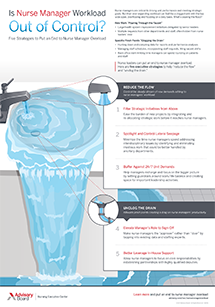Auto logout in seconds.
Continue LogoutMercy's Children's Hospital in St. Louis during a contract year starting this September will test a new summer break staffing model designed to improve nurse recruitment and retention while addressing the seasonal lull.
Millennial nurses are a third of our workforce—here’s how to retain them
How the model will work
Under the model, nurses in Mercy's pediatric unit will be eligible to take advantage of the hospital's new summers off model if they work full-time from September through May. The contract year for the new model will start this September, so next summer will be the first nurses can take off.
Nurses who take the summer off will receive a biweekly stipend and retain their full benefits. Nurses also will be able to use accrued paid time off to pay themselves during the summer, according to CBS' "Money Watch." In addition, nurses will be able to take additional shifts at the hospital if they choose to work.
Mercy plans to start the contract year for the program this September. If the program is successful, Mercy might expand it to other units, according to "Money Watch."
According to KMOV, Mercy's plan is designed to address two key nurse staffing challenges: the national nurse shortage and the summertime drop in demand.
Mercy Pediatric Nurse Manager Justin Travis, explained, "Kids often get sick more frequently during that winter, fall time. And then during the summer, there is less illness, less disease, so our numbers significantly drop, during the summer."
Implications
Seun Ross, director of Nursing Practice and Environment at the American Nurses Association, noted the importance of work-life balance for millennials and younger nurses entering the workforce and said the model could have implications for hospitals elsewhere.
"If it does work at Mercy and evidence is gained it will determine whether other hospitals follow suit," Ross said. "One of the major complaints of millennials and now the future nurses [Gen Z] is the lack of work-life balance in health care. We've seen a whole host of issues in the workplace like burnout and fatigue."
Separately, Travis said, "I've heard nurses say, 'I can stay home with my kids all summer. We have Six Flags passes.' I've heard nurses say, 'I'm going to go to Italy for the summer' Or 'I'm going to go to California and be a nurse there for the summer'" ("Money Watch," CBS, 7/2; Hulsey, KMOV, 6/25; Lagasse, Healthcare Finance News, 7/2; Knowles, Becker's Hospital Review, 6/26).
Here are 5 more ways to recruit and engage nurses this summer
It is more important than ever for nurses to be engaged in their work, committed to their organization's mission, and capable of delivering high-quality care in a complex and constantly changing environment.
Use these resources below to learn how to build a successful nurse retention and engagement strategy for your organization.
- Report: The nurse leader's blueprint for future staffing
- Infographic: Why you're in danger of building the wrong nursing workforce
- Study: Get the national prescription for nurse engagement
- Report: Build a millennial-specific retention strategy
- Infographic: 5 strategies for reducing nurse manager overload
Don't miss out on the latest Advisory Board insights
Create your free account to access 1 resource, including the latest research and webinars.
Want access without creating an account?
You have 1 free members-only resource remaining this month.
1 free members-only resources remaining
1 free members-only resources remaining
You've reached your limit of free insights
Become a member to access all of Advisory Board's resources, events, and experts
Never miss out on the latest innovative health care content tailored to you.
Benefits include:
You've reached your limit of free insights
Become a member to access all of Advisory Board's resources, events, and experts
Never miss out on the latest innovative health care content tailored to you.
Benefits include:
This content is available through your Curated Research partnership with Advisory Board. Click on ‘view this resource’ to read the full piece
Email ask@advisory.com to learn more
Click on ‘Become a Member’ to learn about the benefits of a Full-Access partnership with Advisory Board
Never miss out on the latest innovative health care content tailored to you.
Benefits Include:
This is for members only. Learn more.
Click on ‘Become a Member’ to learn about the benefits of a Full-Access partnership with Advisory Board
Never miss out on the latest innovative health care content tailored to you.

